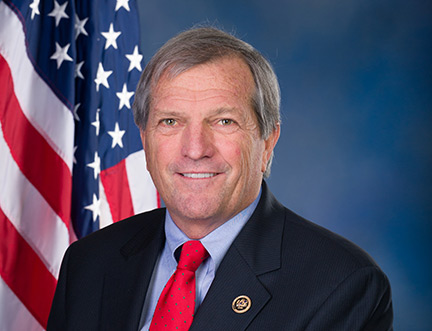Washington, DC – On Monday, as leading American manufacturers continue to design, develop, and unveil commercially-available electric trucks, Representatives Mark DeSaulnier (D-CA), Peter DeFazio (D-OR), Rodney Davis (R-IL), and Lloyd Smucker (R-PA) announced bipartisan legislation (H.R. 4421) that would allow for the testing of trucks powered by electric batteries.
Federal law caps the weight limit on trucks at 80,000 pounds. Since electric battery systems are heavier than diesel fuel tanks, this straightforward bill would allow for a modest weight increase of 2,000 pounds for electric trucks.
“In order to maintain America’s competitive edge well into the twenty-first century, this bipartisan effort is a necessary first step. By adjusting federal law to account for new technological advances, we can help spur innovation, support manufacturers, and promote public health and safety,” said Congressman Mark DeSaulnier. “As a long-time member of the California Air Resources Board and advocate for environmental protection, I am pleased to partner with my colleagues on an effort that will help test energy-efficient transportation technologies.”
“American manufacturers are leading the world in emerging transportation technology, and the recent advances in electric heavy-duty trucks could drastically change the industry for shippers, manufactures, and consumers in the years ahead. This bipartisan bill will encourage the growth of the electric truck industry and the creation of good-paying American jobs, while promoting a transition to cleaner trucks that emit less greenhouse gases. I applaud my colleagues, and look forward to working with them to push this legislation through the House,” said Transportation and Infrastructure Committee Ranking Member, Peter DeFazio.
“I am excited about this new technology, including the numerous safety benefits associated with it, and look forward to seeing how this innovation helps advance the trucking industry,” said Congressman Rodney Davis. “I also hope the introduction of electric trucks continues the conversation about the sustainability of the Highway Trust Fund and the need to create a level playing field by ensuring all highway users are paying into the system.”
“Electric trucks can provide great benefits to both our transportation system and our environment. We should be incentivizing the development of and investment in new technologies to improve our freight system, and one way to do that is to extend the 2,000-pound exemption for natural-gas powered trucks to battery-powered electric trucks. I want to thank Reps. DeSaulnier and Davis for their work on this issue, and look forward to working together to help this new technology thrive,” said Congressman Lloyd Smucker.
The current federal weight limit for commercial trucks is 80,000 pounds. H.R. 4421 would allow electric trucks that are heavier because of their battery technology to exceed this limit by up to 2,000 pounds. Natural gas trucks are already provided the same weight increase, and this bill would establish a parity for electric vehicle (EV) technology.
“EV technology is already showing great promise for the future of safety, environmental protection and customer satisfaction,” said California Air Resources Board Chair Mary D. Nichols. “The current weight restriction laws were designed for a 20th Century fleet, made up of vehicles fueled exclusively of gasoline and diesel. The rules need to be updated to eliminate an unnecessary barrier to introducing the next generation of 21st Century motor vehicles.”


2 comments
We need more parity with fixing our roads. The amount of engine idle is polluting far more than all the electric vehicles you’ll ever make. Drain the swamp and stay off my lawn
Here in California, we are being charged double and triple for road fixing. We have already paid and paid for road repairs for decades! Where did that money go?
Comments are closed.